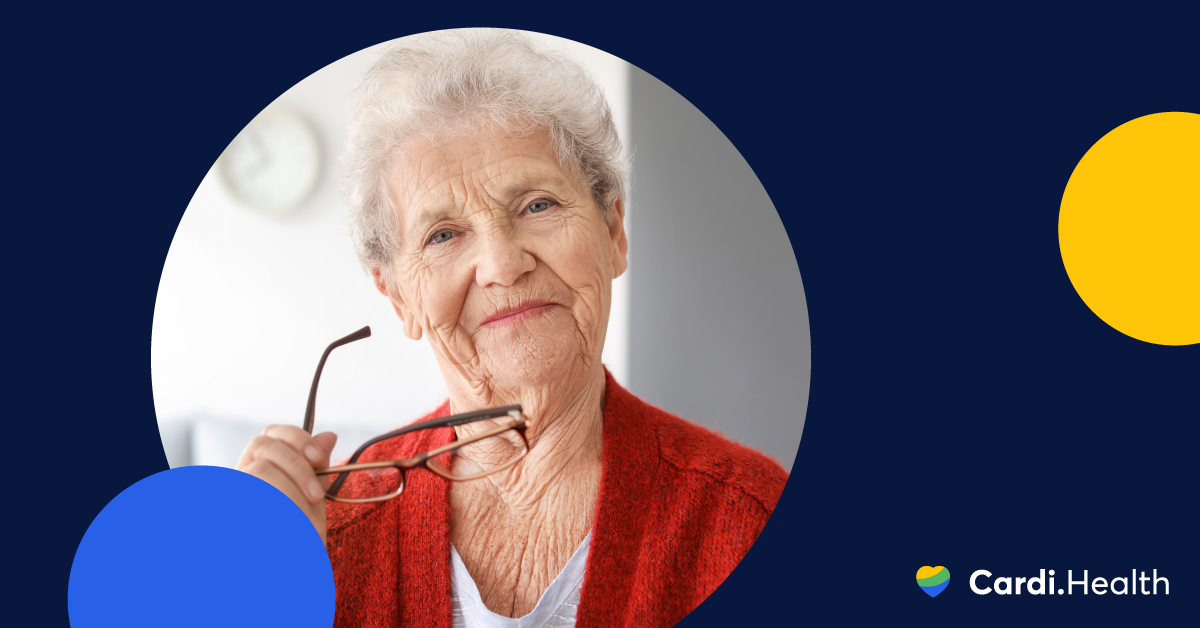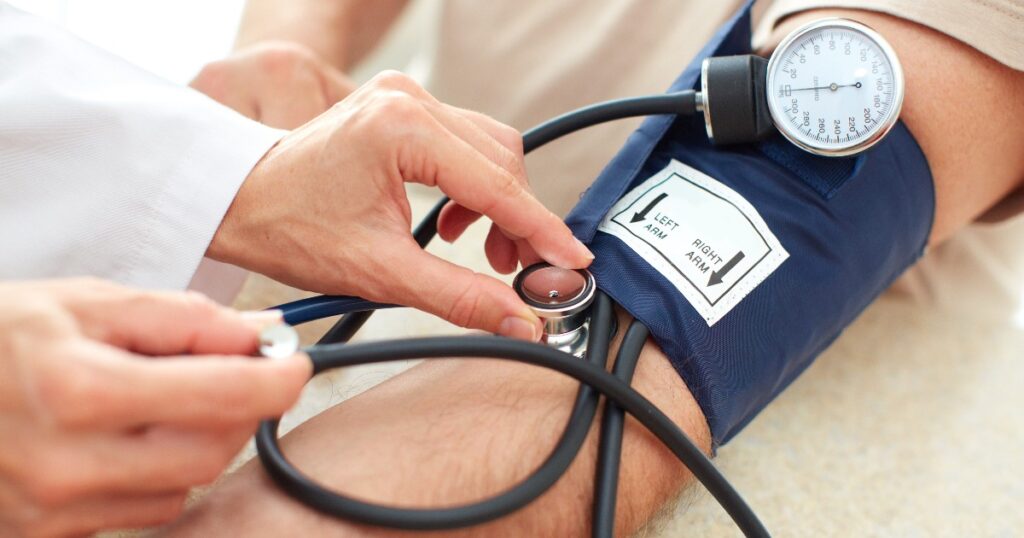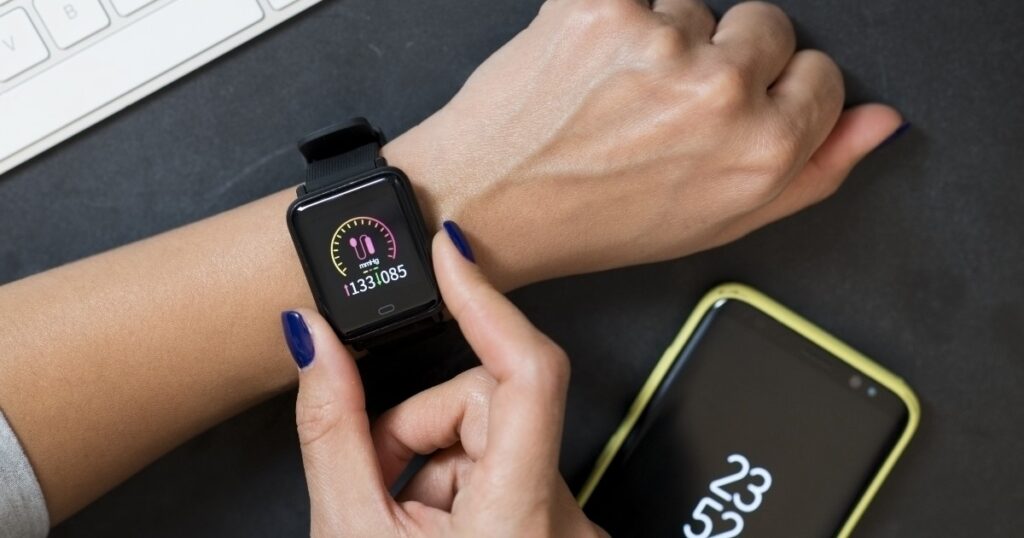What Is Normal Blood Pressure for a 70-Year-Old? A Comprehensive Guide
Your blood pressure is the quickest and cheapest way to get an idea of your cardiovascular health. At a glance, your blood pressure reading can give you an idea of how much stress your blood vessels are going through, regardless of your age.
High blood pressure is more common as you age, which is why keeping track of it as an older person is important. If you’re 70 years old, it is important to know the normal blood pressure you should have. This article will talk about that, so let’s dive in and learn.

Master your heart health now
Take part in our 60sec quiz and get a heart health plan tailored just for you.
Contents
Understanding Blood Pressure at Age 70

Between the ages of 40 and 59, 1 in every 3 people has high blood pressure. However, over the age of 60, this becomes about 2 in every 3 people. Hypertension is more likely the older you get, so it is important to have an understanding of the condition.
The first thing is to understand how to read blood pressure. You will see two numbers. The first is the systolic blood pressure. It indicates the force blood exerts on the blood vessels when the heart contracts. It is always the higher number.
The second is the diastolic blood pressure. It is the force exerted by your blood while the heart is relaxed between pumps.
For example, if your blood pressure reads 135/79mmHg (millimeters of mercury, the unit for blood pressure), it means your systolic blood pressure is 135mmHg and your diastolic blood pressure is 79mmHg.
Start managing your heart health now!
Find out what works for you with this 60sec quiz.

Age and its impact on blood pressure
As a person ages, there are natural changes to the heart and blood vessels. These contribute to the changes in blood pressure by age 70. Most notably, the vessels become thicker and stiffer, and the body’s baroreceptors become less sensitive.
Baroreceptors are the body’s pressure sensors. With age, they become less sensitive, which impairs the body’s ability to maintain normal blood pressure at all times.
The changes in artery walls, especially the aorta, cause elevated blood pressure, especially as their ability to relax and constrict is impaired.
Other factors that can influence blood pressure at 70
Natural aging changes aren’t the only things that can raise blood pressure in older people. Below are other factors.
- Dietary choices: Your dietary choices can have a big impact on your blood pressure, particularly sodium and saturated fat. Many blood pressure management apps, like Cardi Health, can make it easier to stick to a heart-healthy diet.
- Medication: Older folks are likely to be on medication for other conditions, some of which can increase BP as a side effect. These include common medications like NSAIDs, decongestants, and antidepressants. Make sure to talk to your doctor if you suspect your medication is worsening your high blood pressure.
- Sedentary lifestyle: As you get older, it’s natural to be less active. However, being physically inactive increases the risk of hypertension. Regular exercise is one of the easiest lifestyle changes to make, even if it is just a daily walk.
- Other health conditions: High blood pressure can be more likely as a result of other conditions. Diabetes and sleep apnea are two causes common in older people.
Typical Blood Pressure Readings for People Over 70

As a person over the age of 70, it is important to have an idea of the normal blood pressure range for this age, as well as what counts as high blood pressure.
Previously, all blood pressure readings over 150/80mmHg were high blood pressure for anyone over 65 years old. However, in 2017, the guidelines changed to unified ranges, regardless of age or sex.
The blood pressure chart below mentions the blood pressure category and the systolic blood pressure and diastolic pressure, respectively, for each.
- Normal range: <120 and <80mmHg
- Elevated blood pressure (prehypertension): 120–129 and <80mmHg
- High blood pressure (hypertension stage I): 130–139 or 80–89mmHg
- High blood pressure (hypertension stage II): >140 or >90mmHg
- Hypertensive crisis: >180 and/or >120mmHg
Understanding high blood pressure risks
A person’s blood pressure is important since it can give an idea of the state of your arteries. Since they make blood flow through every part of the body, damaged and weak vessels can cause more than just cardiovascular disease.
Here are some complications that can arise from high blood pressure:
- Heart attack
- Stroke
- Heart failure
- Chronic kidney disease
- Loss of vision
- Aneurysm
- Vascular dementia
- Chest pain (angina)
The dangers of low blood pressure
While the aim when you treat high blood pressure is to reduce blood pressure to the normal range, it can also end up too low, especially when using medication. Low blood pressure (hypotension) can also occur outside of treating hypertension.
Blood pressure numbers under 90/60mmHg are considered to be hypotension. You can experience symptoms such as:
- Dizziness
- Fatigue
- Blurred vision
- Nausea
- Vomiting
- Fainting
With abnormally low blood pressure, you might experience shock. This is when your BP is too low to effectively deliver blood through your circulatory system to your vital organs. If you notice the following signs, get immediate medical attention.
- Cold, clammy skin
- Fast, shallow breathing
- Pale skin
- Weak pulse
- Confusion
Monitoring and Maintaining Healthy Blood Pressure

It is important to measure blood pressure regularly and make sure it stays well-controlled. This way, you can seek medical attention any time there are major changes in your BP. Having a blood pressure monitor at home makes this easier.
Home blood pressure monitors are great, but visits to the doctor are equally important.
Start managing your heart health now!
Find out what works for you with this 60sec quiz.

Importance of regular check-ups
Depending on when you were diagnosed and your level of control, your doctor may recommend you check your blood pressure twice a day, once a day, or at wider intervals.
No matter when you take your reading, though, it is recommended to take two readings and get the average. Where one differs by 10mmHg or more, discard it and take another.
Using a blood pressure monitor is simple, too!
- Rest your back in a chair with your feet flat on the ground.
- Put your arm, preferably left, on a flat surface at chest level.
- Wear the blood pressure cuff right above your elbow, with the bladder’s midline slightly on the inside of your bicep.
- Have your forearm on the surface with your palm facing up.
- Sit quietly for 5 minutes.
- Start the BP measurement. Let the cuff inflate fully and deflate on its own.
- Once done, you’ll see the systolic pressure and diastolic pressure displayed. Make sure to record them in your BP log using an app like Cardi Health.
However, even if you get the hang of measuring your BP, you should visit your doctor regularly. They can make necessary adjustments to your medication if needed, and it can also be determined if you have white-coat hypertension or masked hypertension.
Pushing your BP back into the normal blood pressure range doesn’t have to be with medication alone.
Lifestyle changes for blood pressure control

Healthy lifestyle changes can be very effective in helping you get your BP back into a healthy range, no matter your age. Here are some tips you can follow for lower blood pressure.
- Reduce salt intake: Less sodium in your diet is one of the most effective lifestyle changes to move into a lower blood pressure range.
- Increase potassium intake: Potassium can essentially counteract the effects of sodium in your diet. That means increasing your potassium can help manage BP. Bananas, avocados, low-fat dairy, and spinach are great sources.
- Maintain a balanced diet: Beyond sodium and potassium, other dietary changes can not only help reduce blood pressure but can benefit your overall health and help with losing weight. Follow the DASH diet: reduce saturated fats, eat more fruits, veggies, and fiber-rich foods, and eat less added sugar.
- Manage stress: Stress can increase your BP. Stress management techniques like yoga and meditation can help you let off some steam.
- Increase your physical activity: Regular exercise is great for your overall health, but it can also help get you into a normal blood pressure range. As an older person, you can start with any exercise you’re comfortable with, as long as your heart beats a little faster. This could be walking, jogging, swimming, or dancing.
FAQ
As an older person, there are many questions you might have about blood pressure readings and hypertension. Let’s answer some.
What is the new normal blood pressure for seniors?
There’s no special blood pressure range for seniors. What is considered normal is the same as for other age groups.
A reading in the blood pressure range of 90/60 to 120/80mmHg is a normal reading.
Is 150/90 BP normal for seniors?
A blood pressure of 150/90mmHg is not normal for senior citizens. That reading indicates high blood pressure in stage II.
Can drinking lots of water lower blood pressure?
In cases of poor hydration, there may be a noticeable increase in blood pressure. Drinking more water may allow for better blood pressure control, effectively lowering it.
However, in normal cases, drinking more water is likely to have little effect on blood pressure. However, according to The Lancet, it may be beneficial in the prevention of kidney disease.
Start managing your heart health now!
Find out what works for you with this 60sec quiz.

Wrapping Up: Staying Informed and Proactive
No matter your age, it is important to always know what your BP is and to strive to keep it within a healthy range.
You can keep hypertension under control with a balanced diet, regular exercise, stress management, and regular checkups. Taking these steps can not only help with high blood pressure but your general health.
Related articles
Best Foods to Lower Cholesterol
Does Caffeine Raise Blood Pressure?
Does Drinking Water Lower Blood Pressure?
Causes of High Blood Pressure at Night
10 DASH Diet Breakfasts for a Healthy Start
Heart-Healthy Diet Guide
What Should an 85-Year-Old Blood Pressure Be?
How to Read Blood Pressure: A Comprehensive Guide
Wearing a Heart Monitor for 2 Weeks: What You Need to Know
Manage your heart health now
Find out what works best for you with this 60sec quiz and get your personalized heart health plan.

